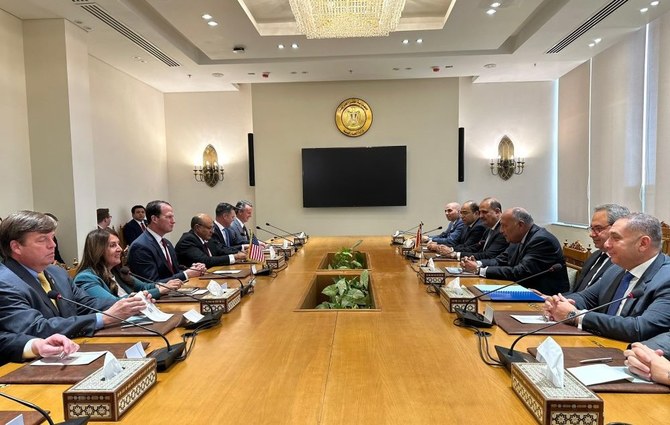BEIRUT: Lebanese President Joseph Aoun assured US Ambassador to Turkiye and Special Envoy to Syria, Thomas Barrack, that Lebanon “looks forward to US support in its efforts to restore security and stability in the south,” adding that this includes the withdrawal of Israeli forces from the five occupied hills, an end to hostilities, and the extension of UNIFIL’s mandate.
He said that UNIFIL, in coordination with the Lebanese Army, is working to implement Resolution 1701, ultimately enabling the army’s deployment along the internationally recognized borders.
Aoun also said that Lebanon will increase the number of army personnel deployed south of the Litani River to 10,000 soldiers. Their responsibilities include eliminating unauthorized armed presence, seizing illegal weapons and ammunition, and ensuring that only official security forces operate in the area.
However, he added that their ability to fully carry out this mandate remains hindered by the Israeli occupation of the five hills and the surrounding areas.
The Lebanese president reaffirmed the country’s commitment to advancing the principle of exclusive state control over weapons. He informed Barrack that “consultations are ongoing at both the Lebanese and Palestinian levels regarding the issue of arms in the Palestinian refugee camps, with the hope that these efforts will intensify once the region stabilizes, following the recent escalation in the Israeli-Iranian conflict.”
A source at the presidency told Arab News: “Barrack was informed that Lebanon is moving toward the withdrawal of weapons from north of the Litani River, but this process will take time. Hezbollah is a Lebanese party, and its members will remain in the country. There is historical precedent — after the civil war, militias gradually handed over their weapons to the state, a process that took considerable time to complete.”
The source said that Barrack, who is overseeing the Lebanese file until a successor to former US envoy Morgan Ortagus is appointed, “demonstrated an understanding of Lebanon’s position during his meetings with political officials on the disarmament issue, and his response was generally seen as positive.”
While no official response was issued regarding Barrack’s warning about potential Hezbollah involvement alongside Iran, the party released a statement on Thursday condemning US threats against Iran’s Supreme Leader, Ali Khamenei.
Hezbollah warned that “threatening his assassination is not only a political miscalculation, but a reckless act with dangerous consequences.”
Hezbollah affirmed that it is “more firmly committed than ever to the path of Imam Khamenei and his firm stance, and more united around his leadership in confronting US-Israeli aggression against the Islamic Republic. Through its blind support for Israel, the US is steering itself toward an abyss from which it will not emerge.”
On Thursday, the Iranian Embassy in Lebanon received a large delegation of Lebanese parties, political forces, and figures aligned with Hezbollah, along with representatives from Palestinian factions closely affiliated with the party.
The visit was held to “affirm their solidarity with Iran in the face of Israeli aggression.”
Iranian Chargé d’Affaires Tawfiq Samadi said that “any military response by Iran will be measured, precise, gradual, and proportionate to the level of threat.”
He placed responsibility on the US for its unwavering support of Israel, saying that it bears accountability for “the crimes committed against Iran.”
While acknowledging that the US is not currently a direct party to the aggression, he cautioned that “continued American support for Israeli actions would carry strategic and legal consequences.”




























